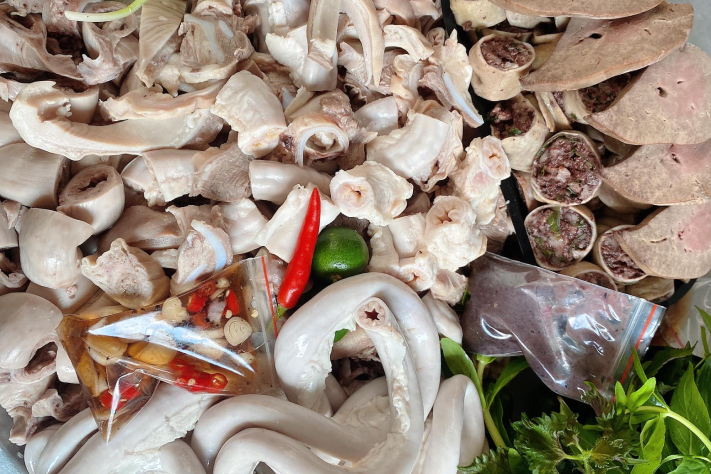Organ meats are rich in nutrients, but how much is enough?
Animal organs such as intestines, liver, and stomach are rich in protein and are popular with many people. However, they are also harmful to health if eaten too much.
According to Dr. Tran Duc Canh - Department of Endoscopy and Functional Exploration, K Hospital (Hanoi), animal organs include the heart, lungs, liver, stomach, testicles, and intestines of animals used as food in the daily diet. The animals that people often take their organs to eat are cows, chickens, pigs, sheep, goats, etc.
Protein in animal organs (except brain and marrow) accounts for about 16-22% of weight. Organs also contain a lot of fat, vitamin A, iron, prevent iron deficiency anemia, increase resistance, maintain muscle mass, bring a feeling of fullness for a long time, and provide choline for the body. People use this food boiled, stir-fried, cooked porridge or many other dishes.
However, animal organs also contain a lot of protein, saturated acids, and cholesterol. When the body absorbs a lot of these substances, it causes vascular diseases - arteriosclerosis (especially coronary artery disease), high blood pressure, etc. Therefore, some groups should limit the use of this food, such as the elderly, obese people, people with cardiovascular disease, digestive disease, and gout.

Pregnant women are also a group of people who should be cautious when eating organ meats, even though they are a rich source of vitamin A, especially liver.
During the period in the womb, the fetus needs to be provided with extra vitamin A. However, some studies show that when mothers absorb more than 10,000 IU of vitamin A per day, the child has an 80% higher risk of birth defects than the group of mothers who take less than 5,000 IU. Therefore, pregnant women need to be very careful, especially if they are taking supplements containing vitamin A.
Doctor Canh noted that it is necessary to choose fresh organs from animals of clear origin, without disease. Recently, authorities have repeatedly seized products made from animal organs of unknown origin and documents being put on the market. Consumers can be poisoned immediately or suffer from other diseases over time if they consume unsafe food.
The purchased organs need to be carefully prepared, washed with salt, lemon, and blanched in boiling water before cooking. The liver, testicles, and heart need to be cut off all the bad parts and fatty membranes. Cook thoroughly, do not eat raw or undercooked organs. When you have leftover organs, you should not leave them overnight because this is a protein-rich food that is easily contaminated with microorganisms.
Doctor Canh recommends not eating offal every day. Adults should eat animal offal 2-3 times a week, equivalent to 50-70g each time. Children should eat 1-2 times a week, equivalent to 30-50g.
